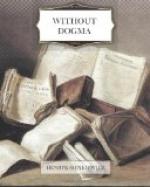To the romantic school quite another class of ideas appeals; to it much of the so-called realistic literature seems very bad, or merely “weary, stale, flat, and unprofitable.” The profoundest utterances of realism do not impress it much in themselves. It insists that art has something to say to literature, that in this field as elsewhere holds good the law of natural selection of types and survival of the fittest.
While each school has its down-sittings and up-risings, its supporters and its critics, neither school has yet exhausted the possibilities of literature. The novel’s aim is to depict Life, and life is neither all romance nor all realism, but a curious mixture of both. Man is neither a beast nor a celestial being, but a compound. Though he can crawl, and may have clinging to him certain brute instincts that may be the relics of his anthropoidal days, he has also, thank God, divine desires and discontents, and certain rudimentary wings. And neither school alone is competent to paint him as he is. The author of “La Bete Humaine” fails as completely as the visionary A Kempis. Neither realism nor romance alone will ever with its small plummet sound to its depths the human heart or its mystery; yet from the union of the two much perhaps might come.
We believe that just here lies the value of the novels of Henryk Sienkiewicz. He has worked out the problem of the modern novel so as to satisfy the most ardent realist, but he has worked it out upon great and broadly human lines. For him facts are facts indeed; but facts have souls as well as bodies. His genius is analytic, but also imaginative and constructive; it is not forever going upon botanizing excursions. He paints things and thoughts human.
The greatest genius assimilates unconsciously the best with which it comes in contact, and by a subtle chemistry of its own makes new combinations. Shakespeare, Dante, Goethe, and the realists, as well as all the forces of nature, have helped to make Henryk Sienkiewicz; yet he is not any one of them. He is never merely imitative. Originality and imaginative fire, a style vivid and strong, large humor, a profound pathos, a strong feeling for nature, and a deep reverence for the forms and the spirit of religion, the breath of the true cosmopolitan united with the intense patriotism of the Pole, a great creative genius,—these are the most striking qualities of the work of this modern novelist, who has married Romance to Realism.
* * * * *
WITHOUT DOGMA.
Rome, 9 January.
Some months ago I met my old friend and school-fellow, Jozef Sniatynski, who for the last few years has occupied a prominent place among our literary men. In a discussion about literature Sniatynski spoke about diaries. He said that a man who leaves memoirs, whether well or badly written, provided they be sincere, renders a service to future psychologists and writers, giving them not only a faithful picture of the times, but likewise human documents that can be relied upon. He seemed to think that most likely the novel of the future would take the form of diary; finally he asserted that anybody who keeps a diary works for the common good, and does a meritorious thing.




